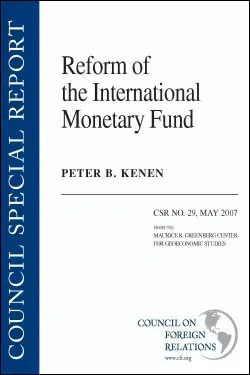
Reform of the International Monetary Fund

- Council Special Report
- Concise policy briefs that provide timely responses to developing crises or contributions to current policy dilemmas.
Overview
The International Monetary Fund’s purpose and scope of work have changed dramatically since its founding after World War II.
Whereas at first the Fund aimed to maintain monetary and exchange-rate stability among a mostly industrialized membership, today most members are developing countries, ranging from large, emerging markets to small, impoverished states. The Fund’s surveillance of macroeconomic issues has expanded to cover topics with little direct relevance to its mandate. Moreover, though no industrialized country has drawn on the Fund for more than twenty years, such countries still dominate the Fund’s decision-making.
More on:
These developments have sparked calls for reform. Proposals to modify the Fund’s activities, lending facilities, and governance have come from many experts, including the Fund’s managing director. Others, who find the Fund illegitimate or obsolete, have called for its abolition. This Council Special Report, written by Peter B. Kenen under the auspices of the Council’s Maurice R. Greenberg Center for Geoeconomic Studies, rejects the urgings of the abolitionists and goes on to contend that efforts to reform the Fund deserve U.S. support. Many countries remain at risk for financial crises, and a strong Fund that can take the lead in responding is in the U.S. interest. With well-managed reform, the Fund could also play a useful role in resolving global economic imbalances. Overall, the report argues, the United States should not try to achieve unilaterally what the Fund can and should achieve multilaterally.
In making this case, Dr. Kenen offers a balanced assessment of the managing director’s reform proposals in both the Fund’s substantive areas of work and its governance—endorsing some, criticizing others, and urging a more aggressive role in confronting global imbalances. Reform of the International Monetary Fund demonstrates that with reasonable reform of its activities and structures, the Fund can remain relevant to the pressing global economic challenges we face.
More on:
 Online Store
Online Store